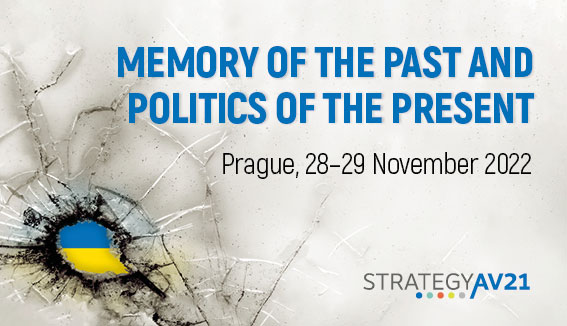A conference 'Memory of the Past and Politics of the Present' will take place on 28–29 November 2022 at Goethe-Institut in Prague.
The conference will use the example of the Russian invasion against Ukraine to analyse to what extent the historical memory affects current politics.
The past has traditionally been one of the interpretation frameworks which are used to analyse and explain present events. It surely applies to the Russian aggression against the Ukraine. Finding analogies in the past is not difficult at all. Indeed, the use of idiosyncratic interpretations of history as demonstrated by Putin or Lavrov in their effort to justify the war against the Ukraine is strongly reminiscent of the argumentation used by Hitler, Ribbentrop or Molotov against Czechoslovakia and Poland in 1938 and 1939.
In the case of the invasion against the Ukraine, however, it is also appropriate to analyse to what extent the historical memory affects current politics, i.e. whether and how much it influences reactions of various European states to the Russian aggression against the Ukraine. For example: is Germany´s restrained policy indeed influenced by the German memory of WWII and feelings of guilt for the crimes committed in the territory of Russia? Or how is it possible that trenches dug by the historical memory (and its different interpretations) could be overcome, as in the case of Poland and the Ukraine? Does it hold true that the memory of Communism (and the Soviet Union´s role in its installation and upholding in different countries) strengthens anti-Russian and pro-Ukrainian position in the case of the Baltic countries, Poland, Czech Republic (and, in fact, also of Finland)? But – if it is really the case – why doesn´t the historical memory play a similar role in Hungary? And where does Slovakia stand in this respect?
Looking for answers to questions of this type and examining similar situations in which historical memory was affecting current politics will be the topic of an international conference organized within the Strategy AV21 in cooperation with a number of partners from abroad.
The ENRS will be represented by two speakers: Jan Rydel (Poland and Ukraine: on Historical Premises of Mutual Relations) and Gábor Danyi (And History Has Yet to Repeat Itself: Russia's War in Ukraine and the 1956 Hungarian Revolution).
The event is organised by Institute of Contemporary History of the Czech Academy of Sciences within the Strategy AV21 in cooperation with the ENRS, Centre français de recherche en sciences sociales, Deutsches Historisches Institut Warschau and Stiftung Sächsische Gedenkstätten.
